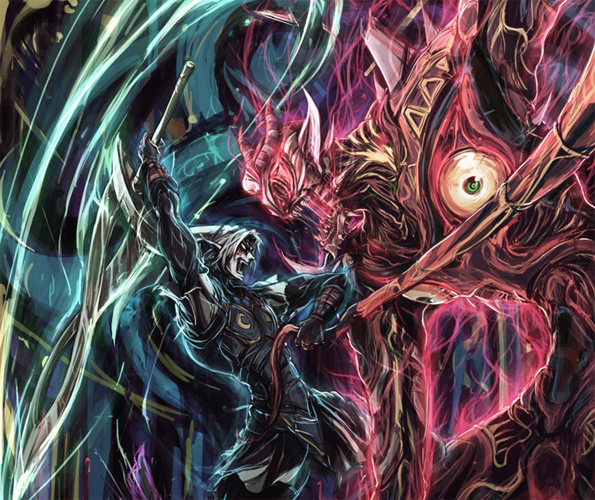Another player who was at the table during the incident sent me this meme after the problem player in question (they had a history) left the group chat.
Felt like sharing it here because I’m sure more people should keep this kind of thing in mind.
Odd because blindness is very commonly represented in mythology and fantasy.
A wheelchair is a tough sell in a questing/adventuring party, but in the right context we have seen paraplegics manage, in a popular fantasy setting ( GoT, bran), but it required someone to move them around
And then there’s bloodborne.
First guy you meet in bloodborne is in a wheelchair.
The old man who helps you is in a wheelchair.
You get shot at by tricked out wheelchair tanks.
One of the PCs (new guy brought in after the other guy left) at the table literally has prosthetic legs as an artificer because his character was born without them.
Magical legs work better for an adventuring party for sure IMO but a wheelchair bound NPC in a city is fine.
Hell the artificer has made it a personal goal to no matter the cost allow people to walk again with their prosthetic legs. (A generous patron gave them their first set) He’s going to encounter one soon (I’m the DM, it’s going to happen) and the player will (likely) have the gold for a set. But they’re not free to make and the components aren’t free.
It’s interesting to me to put problems in front of my players for them to solve in inventive ways. They never fail to surprise me.
Depending on the magic it might not make sense because people could heal everything, although you could explain it away by saying that the character could not afford a skilled healer.
I looked it up and the first known wheelchair that you could move yourself in was invented in the 1600s, which was after firearms became relatively common.
Personally I think of guns as just being specifically missing in fantasy, rather than a marker of when it takes place. Like crossing an ocean in a sailboat doesn’t feel out of place, even though the people who did it in real life had guns.
Yeah the typical D&D setting is not “mediaeval period but with magic”. It’s a weird hodgepodge of mediaeval, renaissance, early industrial, and classical technology, fashions, and cultural practices. If there’s something from any time period from 3000 BCE to 1700 CE and you want to include it, you pretty much can, and it won’t feel out of place in a typical D&D setting.
Yeah, there are some books I’ve read where their technology is clearly advanced enough for guns (ex: The Wheel of Time has advanced metalworking and fireworks, basically all you need to make a gun), but it would completely ruin all of the combat scenes and mess up the plot.
Of course wheelchairs were after guns, after all how you fight in a wheelchair before that
It’s fine, provided it’s not a plot hole - i.e. your fantasy setting needs to not have abolished blindness as a realistic malady, which some settings do. E.g. LOTR 100% has blind people, while the Harry Potter universe only has very poor blind people, since solving blindness is as trivial as a polyjuice potion, even if nothing else works (and something more effective is bound to work).
What I won’t accept is that for some reason, all the illustrations that depict this use the hospital wheelchair design. If you are an adventurer who goes into dungeons, you should be getting something that can handle that terrain better than a squeaky shopping cart. Go for the fantasy version of Professor X’ flying chair. Or at least get something with all-terrain wheels, and have them angled like the ones in the wheelchairs athletes use.
Well yes, but if there is powerful magic in a world, aren’t all disabilities healable?
Why are people in the comments arguing about what is or isn’t possible in D&S or Star Trek or whatever? As far as I can see it, there is no description about what kind of universe this plays in.
It doesn’t make sense to argue whether or not a wheelchair like that “makes sense” in a D&D universe?!
They probably shouldn’t have left. If I was playing I would interrogate the blind person and find out why they don’t try to cure it. Do they hate themselves? Do they like the pity parties people throw for them? Is there a neferious force preventing them from curing it? Or is the DM a fucking idiot?
This would be cool to see! Lots of ways to represent historically unrepresented people in alternative settings.
Well it is quite strange to be so offended of disabled people that you would leave the game But as a devil’s advocate what the problem is actually a world building one. If you establish that the world has magic, magic is widespread and powerful then the fact that there are disabled people could be slightly immersion breaking. For example in DnD lesser restoration a 2nd lvl spell would cure most blindnesses (well except if the person has actually lost their eyes). Hard to say anything more because you gave so little details. Ultimately that person had a disproportionate response but I find your meme both pointless what aboutism and generalization. Hope you have a good day.
Reminds me of my favourite Flamethrower
 Source Tyrant of tower defence game
Source Tyrant of tower defence gameMake magic that cures disabilities, then there’s no more disabled people. The only reason then would be if you want to be disabled.
There’s magic that cures disease, there’s still disease in the world.
There’s magic the raises the dead, there’s still dead people in the world.
Fair enough.
Decouple magic from gods & monsters.
Find freedom.
I don’t have an issue with it, but that wheelchair does look mismatched to everything else, looks too modern.
I wouldn’t consider it “too modern” since contemporary fantasy commonly includes things like tobacco and potatoes, nation-states, and 20th-century English. It’s more like a departure from what you might typically see in the genre of fantasy.
I don’t see why anyone would take issue with it, but one of the coolest things about powerful magic is that nobody needs to be disabled. You can heal them with magic! I know I’d love to get a fantasy healer to heal some of my old wounds. But even in D&D magic comes with a price, and more powerful spells consume very expensive reagents. So it’s understandable that there would still be injured and crippled people.
It also means that people may have disabilities but won’t be held back by them without removing that aspect of their life. And it could be ruled that the differently-abled aspect is something not even magic can take away because it’s so intrinsic to the character
The thing I find difficult about disability in a TTRPG is that it’s something that is either ignorable due to the character backstory (e.g. they have some mcguffin/ability that allows them to operate without difficulty); or it’s going to be a repetitive complication that the party has to constantly work around (e.g. the barbarian carries the wheelchair up every set of stairs they encounter).
If it’s just flavour, then it seems like less of a disability than a backstory. If it’s a constant hassle, then it changes the nature of the game - it becomes more about a party helping each other through individual adversities. The latter sounds fine, but I’m not sure how I’d run it.
If the disability creates a hassle in some way, then it should give a boon in a different way.
Sure getting a wheelchair up the stairs in a hurry will be difficult, but going downhill will make them double their speed and they can carry a second person.
I feel like a lot of the time the best way to handle it would be similar to how the character of Toph is presented in the show Avatar: The Last Airbender. She’s blind, but has incredibly good seismic sense through her feet. So most of the time, she can “see” just fine. However, it’s still a disability, and there are times where it comes up.
If her feet are injured she can’t use them to see. If she’s on sand her “vision” will be very blurry and imprecise. If she’s flying she becomes completely blind. And she can’t read anything written on paper.
The disability is a part of her identity, and it absolutely still matters. But it’s not so heavily crippling that it’s coming up all the time at the table.
A party made up of a blind character, a deaf character, and a mute character. I’d play that.
three disabled halflings in a trenchcoat pretending to be one very perceptive elf
It depends on the tone of the setting. Someone who gets their leg broken in a Forgotten Realms game can usually find a small-time priest to cast Cure Wounds on them, preventing most disabilities that aren’t from birth. Someone who gets their leg broken in Warhammer Fantasy has to hope within their gimped traveling distance that there’s a priest of the correct faith capable of appeasing the gods for the healing to happen, before their detriments become permanent. As such, having a disabled character in a game with more accessible healthcare requires an extra degree of explanation, on top of the PCs’ and players’ emotional response to someone being so downtrodden. The circumstances of their ailment, who or what was responsible, how they see their ailment and work around it, all are weights on the players’ suspension of disbelief that a GM has to take into account that they generally otherwise wouldn’t with John Miller, the able-bodied dude who runs the mill with a wife, three kids, and a problem with rats stealing the grain that he mills. It’s like a Chekov’s Gun in that sort of way, the GM as a storyteller surely wouldn’t spend the effort to decide that an NPC has a trait that is notably separate from the default without it being somehow relevant to the plot. The mage asks the party to do a quest for their magical research, a general asks the party to do a quest for national security, and a person in a wheelchair… what desire do you give them that wouldn’t be misconstrued as able-ist or a waste of that character trait? It’s very difficult, often comes with an air of making some kind of a statement, either that they’re a writer capable enough to wear disabled-face without it being offensive, or taking a preachy high-ground telling people a message about human sympathy, determination, and adaptability that they’ve already been made well aware of by the existence of popular culture.













